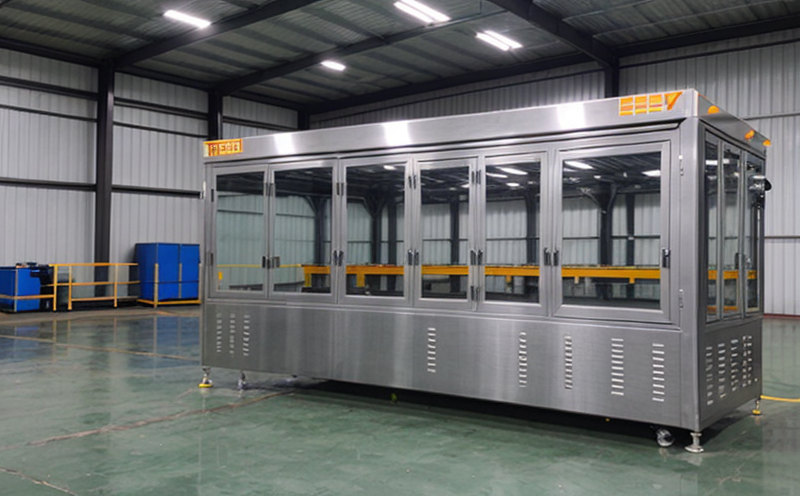ASTM E112 Grain Size Determination
The ASTM E112 grain size determination method is a standardized procedure used to characterize the microstructural properties of metallic materials, particularly in metal packaging. This test is crucial for ensuring that metals meet specific grain size requirements defined by industry standards, which are critical for performance and reliability.
Grain size significantly influences the mechanical behavior of metals such as strength, ductility, hardness, and fatigue resistance. The ASTM E112 method is widely used in quality control processes to ensure that metal packaging materials meet the required grain size specifications set by customers or regulatory bodies.
The test involves preparing a polished metal specimen under controlled conditions and then examining it using a light microscope equipped with a micrometer eyepiece. The process begins with the preparation of the sample, which is critical to obtain accurate results. Proper sample preparation includes cleaning, etching, and polishing the surface of the metal specimen.
Once prepared, the sample is observed under a light microscope at various magnifications (typically 50x-1000x). The grain size is determined by comparing the average diameter of the grains to a set of standard reference charts. This method is based on the Rosiñol-Robbins scale, which provides a standardized approach for categorizing and quantifying grain sizes.
The ASTM E112 test is not only used in metal packaging but also extends its application to various sectors such as aerospace, automotive, and construction. In these industries, the mechanical properties of metals are critical, making precise grain size determination essential. For instance, in metal packaging testing, ensuring that the materials meet specific grain size requirements helps prevent issues like premature failure or inadequate corrosion resistance.
The importance of ASTM E112 cannot be overstated, especially when it comes to metal packaging where even minor variations can have significant implications on product performance and safety. The test provides a reliable means for quality assurance teams to monitor the manufacturing process and ensure that all materials meet the necessary standards.
- International Acceptance: ASTM E112 is widely accepted across numerous countries, including those in Europe (EN 476), Asia (JIS Z 2302), and North America. Its universality ensures that results are comparable worldwide.
- Standards Compliance: The method adheres to international standards such as ASTM E112, ensuring consistency and reliability in testing procedures.
Eurolab Advantages
At Eurolab, we pride ourselves on offering comprehensive and accurate metal packaging testing services. Our expertise in ASTM E112 grain size determination is complemented by advanced laboratory facilities and experienced technicians.
- Advanced Equipment: We use state-of-the-art microscopes equipped with high-resolution cameras to ensure precise grain size analysis.
- Expert Technicians: Our team of professionals is trained in the latest testing techniques and methodologies, ensuring accurate results every time.
- Comprehensive Reporting: We provide detailed reports that include all relevant data and comparisons to industry standards.
- Certified Compliance: Our laboratory is ISO 17025 accredited, ensuring the highest level of quality in our testing services.
Eurolab's commitment to excellence ensures that we are your trusted partner for all your metal packaging testing needs. Whether you require compliance with ASTM E112 or other relevant standards, we have the expertise and resources to meet your requirements.
Why Choose This Test
The ASTM E112 grain size determination test is essential for ensuring that metal packaging materials are of high quality. By using this method, manufacturers can guarantee that their products meet the necessary specifications set by industry standards.
This test helps to identify any potential issues with the manufacturing process and ensures that all materials used in metal packaging are up to standard. It is particularly important for ensuring that the grain size of metals like steel or aluminum meets specific requirements, which can impact the overall performance and durability of the final product.
The precision provided by ASTM E112 allows quality managers and compliance officers to make informed decisions about their processes. This level of accuracy ensures that metal packaging is reliable and safe for its intended use. Additionally, the test helps in maintaining consistent grain size across batches, which is crucial for batch-to-batch consistency.
For R&D engineers, this method provides a valuable tool for optimizing material properties and developing new products. By understanding how different grain sizes affect mechanical performance, they can design materials that meet specific performance criteria. For procurement teams, ASTM E112 ensures that only high-quality materials are procured, reducing the risk of substandard components entering the supply chain.





